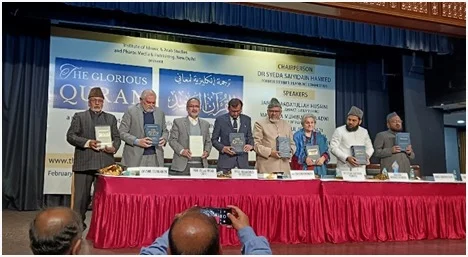New Delhi: The latest translation of the Holy Quran into English was formally launched at the India Islamic Cultural Centre in New Delhi on February 8. The event drew a diverse audience, encompassing scholars, religious leaders, students, and community members, underscoring the significance of the message of Islam for the present times.
The event commenced with recitation from the Holy Quran and its translation, setting the tone for the proceedings, and the recitation of a poem by MahirulQadiri in which the Quran laments that Muslims have forsaken it.
Dr.Zafarul-Islam Khan, the translator and commentator of this work titled “The Glorious Quran,” spoke at length about the need of a modern translation in simple English which should be accessible to everyone in these times when English has spread to all corners of the world but available English translations do not meet today’s needs nor do their commentaries answer questions raised in recent times. Such a translation, in the translator’s view, will facilitate Muslims’ compliance with Allah’s commands and also offer a window for non-Muslims to understand better the Islamic holy book.
The translator, Dr Khan, is a well-known Islamic scholar who studied at Al-Azhar and Cairo Universities and obtained his PhD from Manchester University in UK. He has written and translated over 50 books in Arabic, English and Urdu. He said this annotated translation is available in two editions: one with parallel Arabic text and its translation and the other with only the English translation. Both versions have footnotes and appendices specially written by the translator for this work. He also mentioned that this translation is now also available online at https://thegloriousquran.net/ though the Net edition is still in progress.
Dr. Khan shared his inspiration for translating the Quran into English. He explained that he felt the need to undertake this project because, although there were many translations available – initially done by Orientalists and later by some Muslims – he found that these translations suffered from many mistakes and short-comings. The translation by Abdullah Yusuf Ali, in particular, became very popular among Muslims, but Dr. Khan realised since early 1980s that there were numerous errors whenever he needed to quote translations of specific verses in his speeches or writings. This prompted him to resolve that one day he will publish a corrected version of Abdullah Yusuf Ali’s translation.
Dr. Khan became emotional while recalling how the translation work began. He said that in 2010 he performed Haj with his wife. There, in the Holy Mosque in Makkah, he resolved that he will no longer delay this work. Upon returning home, he started the revision of the translation in January 2011. Initially, progress was slow as he balanced it with his other responsibilities. However, from 2020 to 2023, he entirely dedicated himself to complete this project. So much so that during this period he stopped reading newspapers.
Dr. Khan said that during this work only the most authentic and earliest Arabic sources were used and great effort was made to present the translation of the Quran and introduction of Islam as they were understood by the earliest Muslim scholars and commentators of the Holy Quran. He clarified that he eschewed any philosophical, jurisprudential (fiqhī) or linguistic discussion which eventually cause differences and disunity among Muslims. He said though his work started as an attempt to correct the translation of Abdullah Yusuf Ali but it slowly evolved into a new translation with lengthy introduction of the Quran, a chapter on the life of Prophet Muhammad ﷺ and several indices including Islamic terms and a Quranic index which has made it a comprehensive guide of the Holy Quran and Islam.
He further stated that although he knows the Arabic language very well – like native Arabs – yet he conducted rigorous research and meticulous lexical work to understand meanings of words, terminologies and terms used in the Holy Quran.
[Read more on Radiancenews.com]


